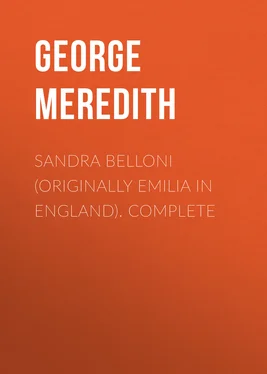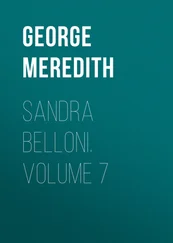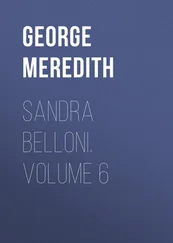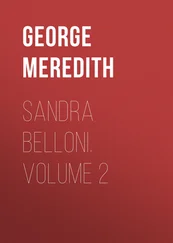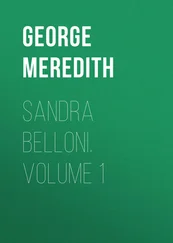George Meredith - Sandra Belloni (originally Emilia in England). Complete
Здесь есть возможность читать онлайн «George Meredith - Sandra Belloni (originally Emilia in England). Complete» — ознакомительный отрывок электронной книги совершенно бесплатно, а после прочтения отрывка купить полную версию. В некоторых случаях можно слушать аудио, скачать через торрент в формате fb2 и присутствует краткое содержание. Жанр: foreign_prose, literature_19, foreign_antique, на английском языке. Описание произведения, (предисловие) а так же отзывы посетителей доступны на портале библиотеки ЛибКат.
- Название:Sandra Belloni (originally Emilia in England). Complete
- Автор:
- Жанр:
- Год:неизвестен
- ISBN:нет данных
- Рейтинг книги:4 / 5. Голосов: 1
-
Избранное:Добавить в избранное
- Отзывы:
-
Ваша оценка:
- 80
- 1
- 2
- 3
- 4
- 5
Sandra Belloni (originally Emilia in England). Complete: краткое содержание, описание и аннотация
Предлагаем к чтению аннотацию, описание, краткое содержание или предисловие (зависит от того, что написал сам автор книги «Sandra Belloni (originally Emilia in England). Complete»). Если вы не нашли необходимую информацию о книге — напишите в комментариях, мы постараемся отыскать её.
Sandra Belloni (originally Emilia in England). Complete — читать онлайн ознакомительный отрывок
Ниже представлен текст книги, разбитый по страницам. Система сохранения места последней прочитанной страницы, позволяет с удобством читать онлайн бесплатно книгу «Sandra Belloni (originally Emilia in England). Complete», без необходимости каждый раз заново искать на чём Вы остановились. Поставьте закладку, и сможете в любой момент перейти на страницу, на которой закончили чтение.
Интервал:
Закладка:
The ladies, upon this hint, wrote to Wilfrid to obtain his concurrence and assistance. He laughed when he read the simple sentence: “We hope you will not fancy that we have any peculiar personal interest in view;” and replied to them that he was sure they had none: that he looked upon Besworth with favour, “and I may inform you,” he pursued, “that your taste is heartily applauded by Lady Charlotte Chillingworth, she bids me tell you.” The letter was dated from Stornley, the estate of the marquis, Lady Charlotte’s father. Her ladyship’s brother was a member of Wilfrid’s Club. “He calls Besworth the most habitable place in the county, and promises to be there as many months out of the twelve as you like to have him. I agree with him that Stornley can’t hold a candle to it. There are three residences in England that might be preferred to it, and, of those, two are ducal.”
The letter was a piece of that easy diplomacy which comes from habit. The “of those, two are ducal,” was masterly. It affected the imagination of Brookfield. “Which two?” And could Besworth be brought to rival them? Ultimately, it might be! The neighbourhood to London, too, gave it noble advantages. Rapid relays of guests, and a metropolitan reputation for country attractions, would distinguish Besworth above most English houses. A house where all the chief celebrities might be encountered: a house under suave feminine rule; a house, a home, to a chosen set, and a refreshing fountain to a widening circle!
“We have a dispute,” they wrote playfully to Wilfrid “a dispute we wish you or Lady Charlotte to settle. I, Arabella, know nothing of trout. I, Cornelia, know nothing of river-beds. I, Adela, know nothing of engineering. But, we are persuaded, the latter, that the river running for a mile through Besworth grounds may be deepened: we are persuaded, the intermediate, that the attempt will damage the channel: we are persuaded, the first, that all the fish will go.”
In reply, Wilfrid appeared to have taken them in earnest. “I rode over yesterday with Lady Charlotte,” he said. “We think something might be done, without at all endangering the fish or spoiling the channel. At all events, the idea of making the mile of broad water serviceable for boats is too good to give up in a hurry. How about the dining-hall? I told Lady Charlotte you were sure to insist upon a balcony for musicians. She laughed. You will like her when you know her.”
Thus the ladies of Brookfield were led on to be more serious concerning Besworth than they had thought of being, and began to feel that their honour was pledged to purchase this surpassing family seat. In a household where every want is supplied, and money as a topic utterly banished, it is not surprising that they should have had imperial views.
Adela was Wilfrid’s favoured correspondent. She described to him gaily the struggle with their papa. “But, if you care for Besworth, you may calculate on it.—Or is it only for our sakes, as I sometimes think?—Besworth is won. Nothing but the cost of the place (to be considered you know!) could withhold it from us; and of that papa has not uttered a syllable, though he conjures up every possible objection to a change of abode, and will not (perhaps, poor dear, cannot) see what we intend doing in the world. Now, you know that rich men invariably make the question of the cost their first and loudest outcry. I know that to be the case. They call it their blood. Papa seems indifferent to this part of the affair. He does not even allude to it. Still, we do not progress. It is just possible that the Tinleys have an eye on beautiful Besworth. Their own place is bad enough, but good enough for them. Give them Besworth, and they will sit upon the neighbourhood. We shall be invaded by everything that is mean and low, and a great chance will be gone for us. I think I may say, for the county. The country? Our advice is, that you write to papa one of your cleverest letters. We know, darling, what you can do with the pen as well as the sword. Write word that you have written.”
Wilfrid’s reply stated that he considered it unadviseable that he should add his voice to the request, for the present.
The ladies submitted to this quietly until they heard from their father one evening at dinner that he had seen Wilfrid in the city.
“He doesn’t waste his time like some young people I know,” said Mr. Pole, with a wink.
“Papa; is it possible?” cried Adela.
“Everything’s possible, my dear.”
“Lady Charlotte?”
“There is a Lady Charlotte.”
“Who would be Lady Charlotte still, whatever occurred!”
Mr. Pole laughed. “No, no. You get nothing out of me. All I say is, be practical. The sun isn’t always shining.”
He appeared to be elated with some secret good news.
“Have you been over to Besworth, the last two or three days?” he asked.
The ladies smiled radiantly, acknowledging Wilfrid’s wonderful persuasive powers, in their hearts.
“No, papa; we have not been,” said Adela. “We are always anxious to go, as I think you know.”
The merchant chirped over his glass. “Well, well! There’s a way.”
“Straight?”
“Over a gate; ha, ha!”
His gaiety would have been perplexing, but for the allusion to Lady Charlotte.
The sisters, in their unfailing midnight consultation, persuaded one another that Wilfrid had become engaged to that lady. They wrote forthwith Fine Shades to him on the subject. His answer was Boeotian, and all about Besworth. “Press it now,” he said, “if you really want it. The iron is hot. And above all things, let me beg you not to be inconsiderate to the squire, when he and I are doing all we can for you. I mean, we are bound to consider him, if there should happen to be anything he wishes us to do.”
What could the word ‘inconsiderate’ imply? The ladies were unable to summon an idea to solve it. They were sure that no daughters could be more perfectly considerate and ready to sacrifice everything to their father. In the end, they deputed the volunteering Adela to sit with him in the library, and put the question of Besworth decisively, in the name of all. They, meantime, who had a contempt for sleep, waited aloft to hold debate over the result of the interview.
An hour after midnight, Adela came to them, looking pale and uncertain: her curls seeming to drip, and her blue eyes wandering about the room, as if she had seen a thing that kept her in a quiver between belief and doubt.
The two ladies drew near to her, expressing no verbal impatience, from which the habit of government and great views naturally saved them, but singularly curious.
Adela’s first exclamation: “I wish I had not gone,” alarmed them.
“Has any change come to papa?” breathed Arabella.
Cornelia smiled. “Do you not know him too well?”
An acute glance from Adela made her ask whether Besworth was to be surrendered.
“Oh, no! my dear. We may have Besworth.”
“Then, surely!”
“But, there are conditions?” said Arabella.
“Yes. Wilfrid’s enigma is explained. Bella, that woman has seen papa.”
“What woman?”
“Mrs. Chump.”
“She has our permission to see him in town, if that is any consolation to her.”
“She has told him,” continued Adela, “that no explanation, or whatever it may be, was received by her.”
“Certainly not, if it was not sent.”
“Papa,” and Adela’s voice trembled, “papa will not think of Besworth,—not a word of it!-until—until we consent to welcome that woman here as our guest.”
Cornelia was the first to break the silence that followed this astounding intelligence. “Then,” she said, “Besworth is not to be thought of. You told him so?”
Читать дальшеИнтервал:
Закладка:
Похожие книги на «Sandra Belloni (originally Emilia in England). Complete»
Представляем Вашему вниманию похожие книги на «Sandra Belloni (originally Emilia in England). Complete» списком для выбора. Мы отобрали схожую по названию и смыслу литературу в надежде предоставить читателям больше вариантов отыскать новые, интересные, ещё непрочитанные произведения.
Обсуждение, отзывы о книге «Sandra Belloni (originally Emilia in England). Complete» и просто собственные мнения читателей. Оставьте ваши комментарии, напишите, что Вы думаете о произведении, его смысле или главных героях. Укажите что конкретно понравилось, а что нет, и почему Вы так считаете.
